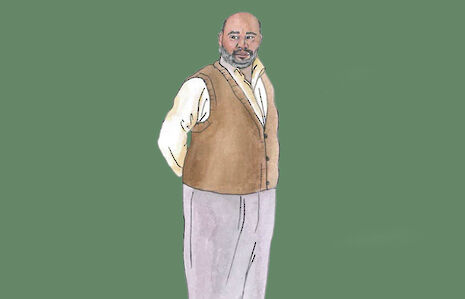Role models need to be within reach
Responding to No Role Modelz, Oliver Moodie argues that in order to break down societal barriers, young people need relatable mentors

(Accompanying piece: J Cole - No Role Modelz)
Oxbridge’s access issues begin long before admissions. Of course, access is important at the University level, but how can we attract students to this city of tall spires and strange attires when it is often far removed from their reality? Individuals should never feel restricted in their ambitions due to a lack of representation in the upper echelons of their fields, and having role models is crucial to believing that anything is achievable irrespective of your social or cultural background.
Their importance is highlighted in the track No Role Modelz, in which J Cole declares “first things first, rest in peace Uncle Phil”. Anyone familiar with the tough love of Will Smith’s father figure on ‘The Fresh Prince of Bel-Air’ can relate to the affection and respect I had for one of television’s most influential fathers.
“He was fictional, and only ever as close as the pixels on our TV screens”
Uncle Phil is the highly-educated, successful stoic patriarch of the Banks family. Coming home after school and sitting down to watch their escapades, armed with a glass of squash in one hand, a jam sandwich in the other, and a packet of crisps gripped precariously under my chin, became as ritualistic as the school run. A lawyer and a judge, Uncle Phil undermines traditional black stereotypes and, for many young black males growing up in the nineties and noughties, he truly was “the only father that [they] ever knew”.
For both characters and viewers, he was someone we could admire not just for being black, but for penetrating an environment overwhelmingly alien, and, considering police race relations in the nineties, for doing so with such brazen disregard for status quo. Similarly, in a world where black art and literature is too often taught as an exercise in sociology and tolerance rather than a rigorous art form, his wife Vivian, a professor of English, was an inspiration for black academics as well as for women striving to break into the world of academia.
Uncle Phil was a fresh appreciation of the modern successful everyday black man. Nevertheless, he was fictional, and only ever as close as the pixels on our TV screens.
Likewise, the lives of the Obamas and Ginsburgs of the world are so far removed from our own that they feel more like brands than real people. If we want to break down societal barriers, we need to provide relatable mentors. No one is more relatable for potential Cambridge applicants than current students. We have a unique opportunity to change the frontispiece of the Cantabrigian narrative by engaging with programmes like the CUSU shadowing scheme. Positive experiences for young students reverberate in their local communities and are key to ensuring no-one’s aspirations are stunted.
The sort of role models I look for are people who make me believe that I have what it takes to be successful - I just need to apply myself. By vicariously sharing their achievements, the possibility of my own ambitions becoming a reality is made all the more tangible. Their success is enough to convince me that no racial, social, cultural, educational or legal barriers can determine my own.
Prior to sixth form, where I was fortunate enough to have extremely supportive teachers, the idea of Cambridge had seemed oxymoronic to me when compared with my background. I often consider how different my trajectory could have been if I had not had such great mentors in my life. For many people, this is a reality.
“being a role model is not about telling people how to live, it’s about living and letting others watch”
There are countless times I’ve been speaking to students who tell me that they didn’t know ‘Oxbridge was a place for them’. For too many black children, their only role models are athletes or musicians, for women in STEM, they are women who have had their successes overlooked by society’s historical misogyny, and for working-class children, they are actors playing stereotyped characters or entrepreneurs with once-in-a-generation ‘rags-to-riches’ stories. For too many, there are too few academic role models, and even fewer who aren’t just appreciated remotely, but with whom we can share a real everyday relationship.
Role models provide so much more than words of wisdom. Words are ephemeral, misinterpreted and often fall upon deaf ears. Moving speeches stay with a person for a matter of days before fading into the annals of our memories - this is especially true for children. Children have never been very good at listening to their elders, but have never failed to imitate them. By providing a window into our lives, mentorship, even in its most informal state, creates a palpable path between their life and ours; a path which shows that academic success should never be above the glass ceiling.
Our capacity for prosocial behaviour should drive us to make an effort to be role models for others, especially with so many bountiful opportunities. Shadowing Schemes provide the perfect occasion, because being a role model is not about telling people how to live, it’s about living and letting others watch.
Mentors have an opportunity to provide salubrious dollops of confidence and experience into the lives of those who look up to them. Imagine if everyone had an Uncle Phil in their lives to emulate and learn from. It’s the intangible factors like communication, motivation and perspective, gained from relatable role models that will inspire the next generation to dream, and the knowledge of a familiar face in an unfamiliar setting that will help turn those dreams into realities.
 News / Hundreds of Cambridge academics demand vote on fate of vet course20 February 2026
News / Hundreds of Cambridge academics demand vote on fate of vet course20 February 2026 News / University Council rescinds University Centre membership20 February 2026
News / University Council rescinds University Centre membership20 February 2026 News / Judge Business School advisor resigns over Epstein and Andrew links18 February 2026
News / Judge Business School advisor resigns over Epstein and Andrew links18 February 2026 News / Petition demands University reverse decision on vegan menu20 February 2026
News / Petition demands University reverse decision on vegan menu20 February 2026 News / Caius students fail to pass Pride flag proposal20 February 2026
News / Caius students fail to pass Pride flag proposal20 February 2026










